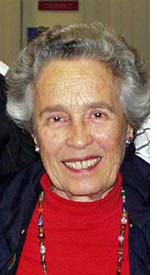By Eileen Wingard

SAN FRANCISCO — Two distinguished musicians were honored by my sister Zina Schiff at her violin recital in Temple Emanu-El’s concert series in San Francisco last Monday evening. She dedicated her program to the memory of violinist Israel Baker, one of her former teachers and life long friends, and she gave premiere performances to Menuhim’s Song and the Brandeis Sonata by Eric Zeisl, the Viennese refugee who taught at Los Angeles City College and wrote Hollywood movie scores. Zeisl escaped Hitler with the help of the French-Jewish composer, Darius Milhaud.
After listening to Zina’s award-winning Naxos CD of Bloch’s Violin Concerto, Israel Baker sent her the music to the Zeisl Sonata, urging her to learn and perform it. He was the only one who played and recorded the work, and he knew, in Zina’s capable hands, the beautifully crafted piece, inspired by Zeisl’s residence at the Brandeis Camp Institute, would have a supreme interpreter.
Zina performed the sonata at the conclusion of a program which opened with another Zeisl work, Menuhim’s Song from Zeisl’s opera, Job. This piece, Zeisl presented to me when I was a college student attending the Brandeis Camp Institute. It was during the tenure of the great Jewish Choral Director, Max Helfman, who ran an arts component to the institute to which he invited some of the foremost Jewish performers, musicologists and composers. Zeisl heard me play and presented me with his piece. When Zina told me of the Zeisl Brandeis Sonata, I sent her the short work. It served as an impressive recital opener. It combined the Jewish idiom with twelve-tone harmonies, illustrating the influence of Arnold Schoenberg, who became part of Zeisl’s family when his daughter, Barbara, married Schoenberg’s son. In fact, Zeisl’s daughter wanted to attend Zina’s program, but she needed to be with her husband in Vienna for the yearly symposium on the music of Arnold Schoenberg.
Israel Baker’s daughter, Hillary, flew up to San Francisco to attend the program dedicated to the memory of her father, who died recently at the age of 92. Baker was the favorite violinist of Zina’s teacher, Jascha Heifetz, and would always play second violin in chamber music performances and recordings with the great master. Israel Baker was the concertmaster for the orchestras of Paramount Pictures, Columbia and Capitol Records. Hollywood composers Hermann, Waxman, Previn, Shifrin, Zeisl and others preferred him. He collaborated with conductors such as Stokowski, Toscanini, Leinsdorf and Walter. Stravinsky used him for the historic recording of L’Histoire du Soldat. When Heifetz first auditioned Zina, he felt she needed more coaching on her scales, so he asked Israel Baker to work with the young teenager. Zina has fond memories of those sessions which helped mold her marvelous technical prowess.
At the San Francisco recital, the Zeisl opener was followed by Aaron Copland’s three-movement sonata, inspired by a friend who died in World War II. Its lyrical opening movement, stark middle movement and ascerbic rhythmic last movement received a memorable reading. The first half of the program concluded with three charming Heifetz arrangements of Gershwin songs: “Bess, You Is My Woman Now,” “Summertime,” and “It Ain’t Necessarily So.” In these selections, the violin took on the suave coloring of a blues singer. Zina was supported throughout by the outstanding Canadian pianist, Zsuszana Lukacs. Born in Romania, Zsuszana studied in Poland, Switzerland and Canada. The two performed the same program two nights earlier in Vancouver, British Columbia.
Opening the second half, Zina and Zsuzsanna played Ernest Bloch’s Avodah. The characteristic Hebraic idiom, which Zina projected with deep, authentic passion, blossomed forth in this miniature. Then came the Brandeis Sonata. The first movement was so profound and virtuosic that the audience broke into spontaneous applause. The second movement had the quality of a heartfelt prayer, and the final Rondo contained a Chassidic Dance theme which whipped into an ecstatic frenzy, bringing the audience to its feet in excited adulation. As one listener remarked to the two artists, “You left the audience breathless, your playing was so beautiful!”
Zina and Szuszana offered two encores, Robert Dauber’s Serenata, and the music from Schindler’s List. Dauber was a cellist interned in Terezin who was murdered by the Nazis in 1943.
All the composers programmed were from the 20th century, and they all worked at one time or another in Hollywood. It was fitting for Violinist Zina Schiff, born in Los Angeles, who herself played on the sound track of a famous Hollywood movie, The Fixer, to design such a program and to dedicate it to one of Hollywood’s greatest musical stars, her teacher and friend, violinist Israel Baker.
*
Wingard is a freelance writer and former violinist with the San Diego Symphony. She may be contacted at eileen.wingard@sdjewishworld.com
Pingback: Zina Schiff features 20th century composers in nostalgic concert – San Diego Jewish World | Music Trends in Romania